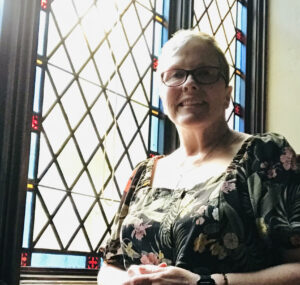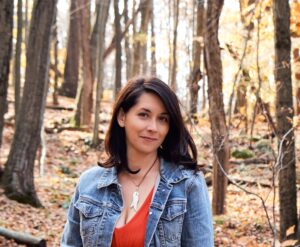
Answering Your Call, Your Way: Connecting with Rev. Jennifer Lessard
By Lynn Trotta
When we see someone responding to their vocational call, we might assume, “They can do it because they have (insert degree, training, or other unrealistic assumption of perfection).” We often choose to believe “I’m not enough” rather than to forge into the unknown. I was guilty of believing these limiting stories before interviewing Reverend Jennifer Lessard. Initially, I found her international chaplaincy work with communities in South America battling companies destroying their sacred homelands a little (okay, a lot) intimidating. After all, I thought, a woman who has contributed to such monumental work surely had been planning it for years. But when I spoke with her, Rev. Lessard assured me that her work in Ecuador was very unexpected. In fact, she said, “It's not something I sought out at all. I'm the least likely to get involved in all this.”
I reached out to Reverend Lessard, who serves as a part-time pastor of York Baptist Church in Western New York, to learn more about her role as a climate conscious chaplain. It was at her home church that, in November 2022, she heard a guest speaker discuss the spiritual and environmental justice struggles in Guatemala, including Indigenous people resisting the devastating effects of petroleum, lumber operations, and palm oil industries. After the presentation, Rev. Lessard accepted an invitation to join a pilot immersion program in Ecuador. “I thought about it and went as a leap of faith, and honestly, it was life-changing,” she recalls.
This pilot program evolved into a partnership called Walking Together, supporting the Sinchi Warmi, Women in Resistance, in Indigenous communities in Ecuador. Rev. Lessard works in alliance with International Ministries Short Term Missions program as a volunteer chaplain.
This concept of mission work represents a shift from the more traditional model. As Rev. Lessard explains: “As we all know, Indigenous communities have had centuries of harm caused by missionaries, but this relationship is very different. Instead of being a spiritual leader, I go to be spiritually present. It’s being Christ in the world. Being the gospel. Being present means getting in the mud, working, planting trees at 12,000 feet, and fishing for piranhas in a rainforest river alongside the community. Today, one of our key goals is restoring and healing the land, relationships, and culture.”
And there is much to repair. Baptist missionaries arrived in the 1970s when petroleum companies set their sights on these communities. The newcomers built churches and spread their version of the gospel message. At the same time, they effectively erased many religious rituals that had been handed down for generations, such as face painting and fiestas before hunting and fishing. Today, the shift from proselytizing to chaplaincy is a step towards justice. As Rev. Lessard says, “The fact that I'm a Baptist and I'm repairing some of the harm that previous Baptist missionaries did is profoundly meaningful to me.”
Rev. Lessard sees her work as a climate-informed chaplain as different from traditional spiritual accompaniment. She notes some of the direct impacts of the battle against extraction — the murder of a protester, fighting between communities over accepting money from companies rather than choosing to preserve sacred places, and forest fires in areas no longer immune because of reforestation with non-native species — which have a deep influence on her work.
Rev. Lessard stresses, however, that the key difference is a return to a mindset of oneness. “Indigenous cultures consider the environment very differently because when a whole section of their land burns, they burn. It is an integrated way of being, and in our individualistic society, we see nature as something separate. Something that provides for us. Just a resource. But it is very much a part of us. We are all creation. It’s important to understand that environmental justice work goes beyond logical argument. It requires a change of heart.”
Rev. Lessard describes her path as a transformative journey filled with gifts and growth opportunities. She feels a profound trust in Ecuadorian communities and is inspired by Latin American culture's embrace of deep emotions. She feels proud of navigating the physical challenges and the ability to learn a foreign language despite a hearing impairment.
The most challenging part of Rev. Lessard’s unique ministry has been money. Miraculously, each trip has just enough to make it work.
Although Rev. Lessard gets some backing from International Ministries, her work is a volunteer position, leaving gaps to be filled through fundraising and speaking engagements. Rev. Lessard brings over a decade of experience in the financial world to her current work, which helps with budgeting and grant writing. She believes her eclectic life experiences have led her to this moment. Her diverse childhood school fostered a sense of cultural humility. Her double major in elementary education and sociology paved the way for understanding how we learn and behave as individuals and communities. An MBA launched a finance career. Finally, she completed a Master of Divinity, which included a unit of Clinical Pastoral Education in a hospital trauma unit, where she learned to be a steady presence in unthinkable situations.
Most recently, Rev. Lessard has participated in the Climate Conscious Conversation Circles with The BTS Center. Of her experience in the Circles, she says: “I can't tell you how valuable that was for me because this is such a unique and odd path that I didn't expect. Being able to sit and work with others involved in similar work, learning about this, and evolving into this new form of chaplaincy was hugely impactful.”
Rev. Lessard fiercely stands by her belief that what is needed most in climate conscious chaplaincy is “spiritual curiosity, openness, honesty, and your prior life experiences.” She reflects: “I don't need to know all the things, because I'm walking with the other person. Don’t get caught up in the thought, ‘I'm not ready to do this kind of work’ or, ‘I don't know enough.’ Just keep learning and following Spirit. It takes a massive leap of faith to do this thing. I don’t know what I’m doing, and I must be okay with that.”
Rev. Lessard reminds us that we are enough. “Don't minimize what you offer — you might not be able to be part of a protest march. You might not be the one hiking six miles in a rainforest. You might not be writing a check. Still, every little bit that people do — those words of support and encouragement, every little thing we do in community — matters. Don’t try to do things by yourself. The Holy Spirit provides a service for everything we're called into. Never minimize anything you're doing. It's enough. You are enough.”
And isn’t this a message we receive each day from our planet? The amount of oxygen around us is enough. With a little more or a little less, we wouldn’t be able to breathe. The amount of sun each day is enough to provide warmth and light, then night provides enough darkness to restore our bodies.
The gravitational pull is enough to hold us to our world but not so strong that it disrupts our skeletal structure. We are invited to lean into enoughness — no minimizing, no shrinking, no more waiting until you ‘have it all figured out.’ The world and her children need you, exactly YOU, to answer your call, in your own unique way.
Meet Jennifer Lessard
 Reverend Jennifer Lessard, a native of Rochester, New York, is the part-time pastor of York Baptist Church in a rural community in Western New York. Ordained in 2021, she has served in various roles across local churches for decades. Jennifer is also involved with indigenous women in Ecuador through a group called “Walking Together.” Her work, supported by American Baptist Churches USA and International Ministries, focuses on revealing God’s peace and care to those who feel hopeless and alone. Rev. Lessard was a participant in The BTS Center’s 2024 round of Conversation Circles: Earth and Climate Chaplaincy.
Reverend Jennifer Lessard, a native of Rochester, New York, is the part-time pastor of York Baptist Church in a rural community in Western New York. Ordained in 2021, she has served in various roles across local churches for decades. Jennifer is also involved with indigenous women in Ecuador through a group called “Walking Together.” Her work, supported by American Baptist Churches USA and International Ministries, focuses on revealing God’s peace and care to those who feel hopeless and alone. Rev. Lessard was a participant in The BTS Center’s 2024 round of Conversation Circles: Earth and Climate Chaplaincy.
Meet Lynn Trotta
 For over twenty-two years, Lynn has been dedicated to helping people of all ages mend and find effervescence in their sacred bonds—within themselves, with their community, and with the more-than-human world. As she nears the completion of her MA in Chaplaincy at Hartford International University for Religion and Peace, she is exploring how to offer spiritual care in a world shaped by climate change.
For over twenty-two years, Lynn has been dedicated to helping people of all ages mend and find effervescence in their sacred bonds—within themselves, with their community, and with the more-than-human world. As she nears the completion of her MA in Chaplaincy at Hartford International University for Religion and Peace, she is exploring how to offer spiritual care in a world shaped by climate change.
